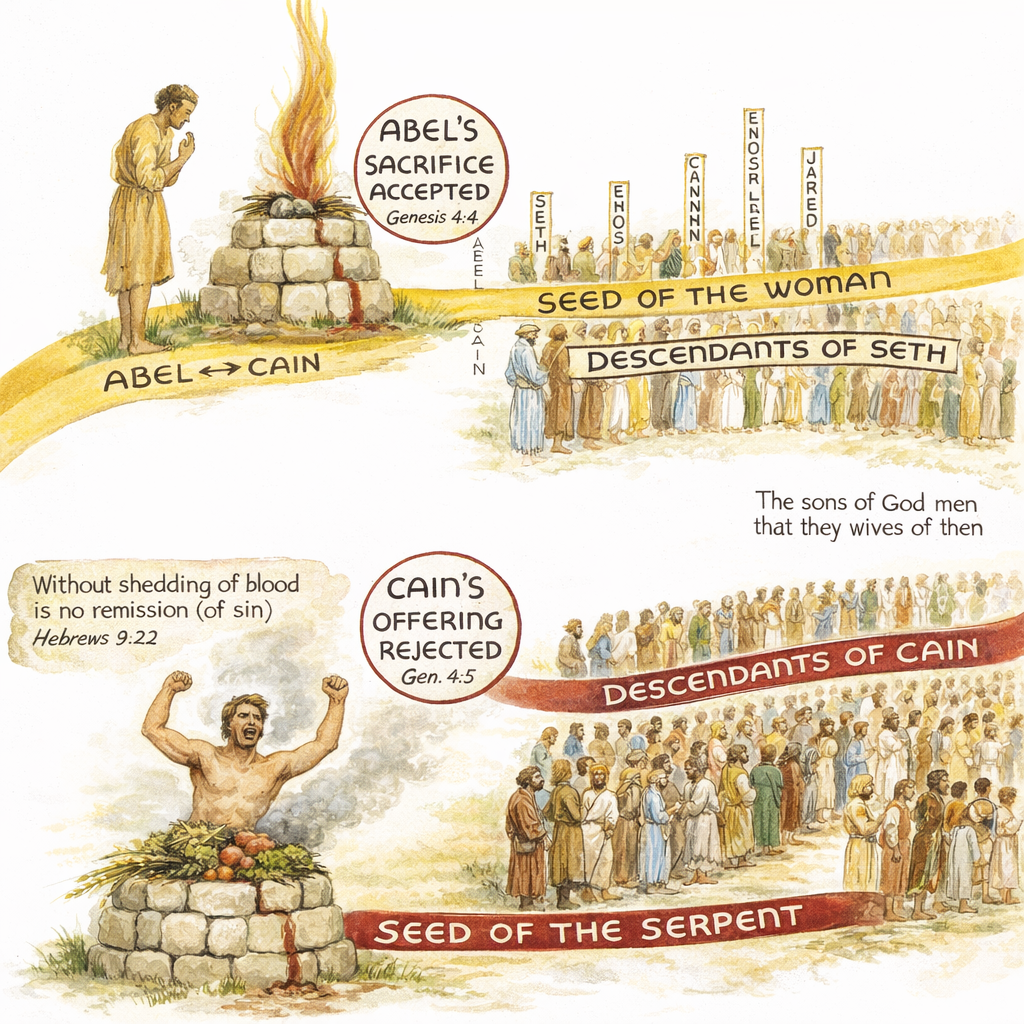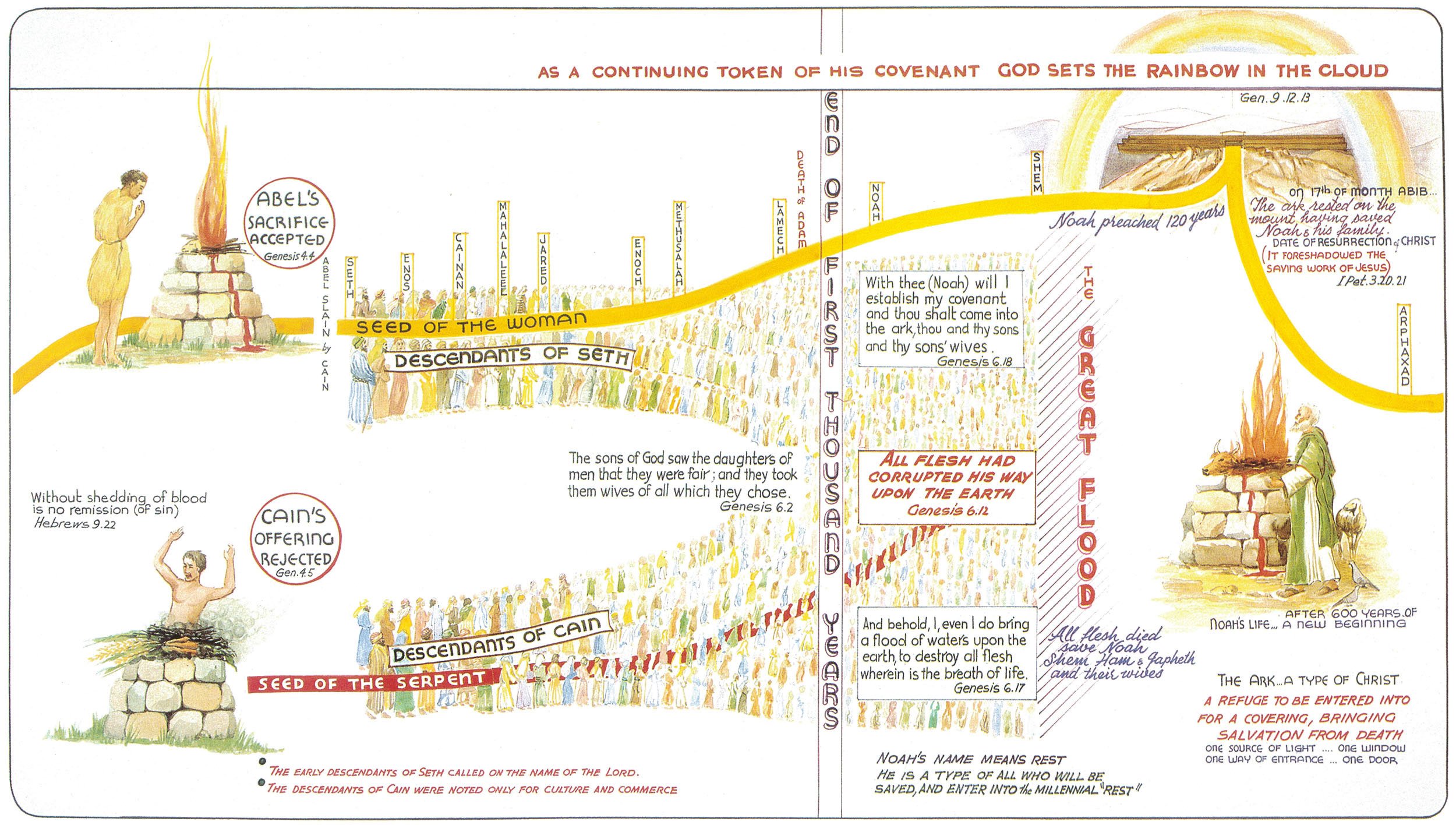The Two Lines of Descent
The Two Lines of Descent
The two lines of descent (or seeds) from Adam which are set out in Genesis are those of Cain (Genesis 4) and Seth, who replaced Abel (Genesis 5).
Having ignored God’s offer of mercy, Cain removed himself from the presence of the Lord, going east to “the land of Nod”, meaning “exile” (Genesis 4:16). He exiled himself from the influence of instruction in the ways of God. His descendants therefore were wilful, and quickly degenerated into the godless ways of wickedness and sin. When we come to the days of Noah we find that this line was predominant in the earth, producing the unrestrained wickedness that brought divine judgment in the flood.
After the murder of Abel by his brother Cain, Adam and Eve had another son whom they named Seth, meaning “appointed”. The reason this name was chosen is given: “For God hath appointed me another seed instead of Abel” (Genesis 4:25). Seth and his descendants identified with God and His ways: “Then began men to call upon the name of the LORD” (Genesis 4:26). An outstanding example in this line was Enoch who “walked with God” (Genesis 5:22). He warned his generation of God’s impending judgment on the utter ungodliness that filled the earth (Jude 14–15). We are reminded of the faith of Enoch in Hebrews 11:5. So there was by now a clear line of demarcation between the two “seeds”. Those who followed God’s ways were called “the sons of God”. Yet by Noah’s day even these “sons of God” had departed from God’s ways.
The Wickedness of Mankind
“God saw that the wickedness of man was great in the earth” (Genesis 6:1–8)
The period from the creation of Adam until the flood was 1656 years. This was a long period of time in which wickedness had multiplied and developed to an alarming degree.
We recall that when God initiated the marriage between Adam and Eve (Genesis 2:23–24), He established the principles upon which true marriage was to be based. His purpose was that a couple, in their godly fear, would be united in their desire to honour Him and so produce a family whom they could instruct in His ways (Malachi 2:14–16; Ephesians 5:25–28; 1 Peter 3:7; Ephesians 6:4). Sadly, by Noah’s day, the principles of marriage as God initially intended were completely rejected and marriage had become a meaningless ritual.
Genesis 6:2 “The sons of God” This is a term that is used in the Bible to describe those who have been instructed in God’s ways (1 John 3:1). We note that the line of Seth had produced several who believed God and trusted in Him, namely Enoch (Genesis 5:24), Lamech (5:28–29) and Noah (6:9). The vast majority by now had neglected the truth of God they had once known. Many who had been instructed in God’s ways departed from them and found pleasure in the company of those who had either forsaken God or never known Him.
“The daughters of men” The distinction made is that these women were not “of God”. Later, God forbad Israel to intermarry with the nations of Canaan who were pagan, as they would soon be turned away from serving Him (Deuteronomy 7:3–4).
“They saw … that they were fair” They were attracted to them on a purely sensual basis. It had been clear from the very beginning when Eve was created, that the companionship the woman would provide should help the man reflect God’s ways. The “sons of God” had lost sight of that godly purpose.
Genesis 6:3 “For that he also is flesh” Mankind was wilful, determined to go his own way. Such behaviour is characteristic of mortal mankind (“flesh”) when they stray from God’s way. God would not continue to strive with such wickedness.
“his days shall be 120 years” Here is an example of God’s longsuffering. He would allow 120 years for mankind to repent while Noah warned the people and the Ark was being built (1 Peter 3:20).
Genesis 6:4 “giants” Hebrew nephilim. The same word is used of the warlike giants who later lived in the land of Canaan and who used violence to gain rule over others (Numbers 13:33). Thus when the “sons of God”—those who initially belonged to families who had feared God—married the ungodly “daughters of men”, their children were known as “mighty men… men of renown”. Human might rather than godly meekness became the way of life.
“mighty men” Hebrew ha gibborim meaning “powerful champions” in war. The word is used of Nimrod (Genesis 10:8) and Goliath (1 Samuel 17:51).
“men of renown” Hebrew for “renown” is shem and means “name”. These great men ‘made a name for themselves’ as so many men have in the past, eg Hitler, Mussolini, Stalin and other such tyrants, and as so many do today as they grasp for power. Their names are renowned for their infamy rather than their good deeds. The effect of such wickedness in Noah’s day was that the earth was filled with wickedness, corruption and violence.
How God Saw Mankind’s Wickedness
God’s estimation of mankind’s wickedness (Genesis 6:5–13)
Genesis 6:5 “And God saw” How foolish to think that God is not aware of the state of sin in His earth (Jeremiah 23:24).
“the wickedness of man was great” Note how this period is described in the New Testament (1 Peter 3:20; 2 Peter 2:5; Luke 17:26–27; Matthew 24:37–39).
“every imagination of the thoughts of his heart was only evil continually” God specifically attributes the sinful state of the earth to mankind themselves. Evil comes from “the heart of man” (Mark 7:20–23; Jeremiah 17:9). The idea conveyed by the Hebrew word yetzer, translated “imagination”, is whatever is formed in the mind, the intentions of a mankind’s heart. The heart or mind is the seat of evil, for that is where every desire has its beginning. What God saw was that every man and woman wanted what was evil (James 1:13–15).
Genesis 6:7 “I will destroy man whom I have created from the face of the earth” God could see that such a severe course of action was necessary to deal with the problem of mankind’s wilful and ungodly behaviour.
Genesis 6:8 “But Noah found grace” In contrast to verse 7 which speaks of God’s severity, this verse speaks of His goodness. His “grace” or “favour” is the basis for mankind’s salvation (Ephesians 2:7–10; Exodus 34:6; 33:19). Noah’s character is described in verse 9. He too, like Enoch (Genesis 5:22), “walked with God”. God was real to him. Because of this Noah and his family were saved.
Genesis 6:11 “The earth also was corrupt before God, and filled with violence” When men and women ignore God and forsake His ways and determine to follow their own desires, invariably corruption and violence are the result and all society suffers. This complete moral and social collapse began when those who had known God’s ways turned away from them and married those who were willingly ignorant of God’s ways (Genesis16:1–2).
Adapted from “The Exploring the Bible Course” by David Evans

